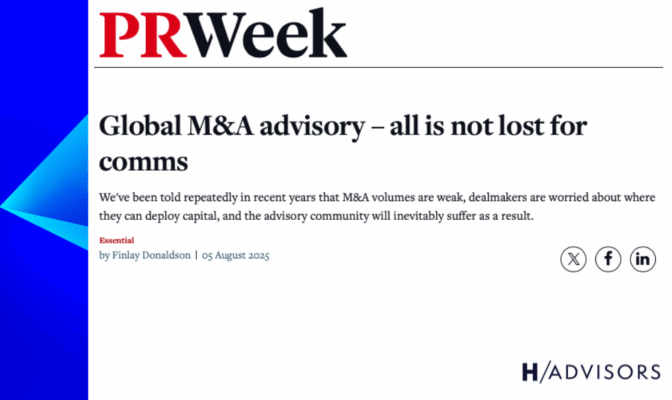H/Advisors M&A advisory stands strong in a challenging market
Share on LinkedIn

We have been told repeatedly for the past few years that M&A volumes are weak, that dealmakers are worried about where they will be able to deploy capital and that the advisory community will inevitably suffer as a result. However, this week’s numbers from Mergermarket, in its Global M&A Rankings for 1H25, suggest that the volume of deals being worked on by advisors in the Communications sector have only marginally decreased in the first half of 2025 versus 2024. Encouraging signs despite market sentiment.
And, while there has undoubtedly been a hit so far in 2025 following Liberation Day and conflict in the Middle East, good deals are still being done, particularly where companies are targeting adjacent areas of strategic growth like AI. Meanwhile, the private capital industry has a significant amount of dry powder to deploy, which is leading to increasingly aggressive buy-and-build strategies to demonstrate portfolio company value creation to investors.
Geopolitical concerns and macro-economic issues like inflation and the interest rate environment have certainly impacted some listed companies’ ability to access capital and secure appropriate financing packages. But one company’s misfortune is another’s gain. Those with strong balance sheets and with the backing of a supportive investor base (which in many cases means the largest and longest-standing private equity buyout funds) are still able to identify attractive investment opportunities (often at a discounted price) and offer a viable exit route for those struggling to come to terms with these complex market conditions.
The private equity industry is perhaps best positioned to capitalise on this market dislocation. According to McKinsey & Company’s Global Private Markets Report 2025, private equity “capital deployment increased by double digits across asset classes” in 2024, with managers adjusting to the new interest rate environment and exploring ways to create value across the portfolio to achieve their goal and deliver returns to Limited Partners. This focus on value creation has led to more ambitious buy-and-build (acquisition) strategies as private equity managers look to achieve return multiples without the assistance of levers like cheap debt in a zero-interest rate environment. Along with this huge amount of private equity dry powder, the private credit industry (which largely finances private equity-sponsored deals) has continued to grow at a rapid and exponential pace. The replacement of traditional bank lending by these credit behemoths may allow riskier deals to continue to close, given the lack of constraints on liquidity compared to their banking counterparts.
But what about the supposed negative impact of Liberation Day? The US has long been the home of the most aggressive exponents of M&A, both corporate and private equity. However, with Trump’s tariffs failing to curtail other global superpowers like China, and European countries looking to increase investment in its mid-market “powerhouse” in response to the lack of US investment abroad, we may see the balance of power shift. Deals may land in Europe or Asia, rather than North America, as capital readjusts from the US exceptionalism of the past decade.
The upshot? Deals will continue to be done, but perhaps not where we might have expected, with added layers of complexity making the advisory community a continued crucial part of the value chain. All, it would seem, is not yet lost.
Article originally posted in PR Week
Finlay Donaldson, Associate Partner
H/Advisors Maitland

